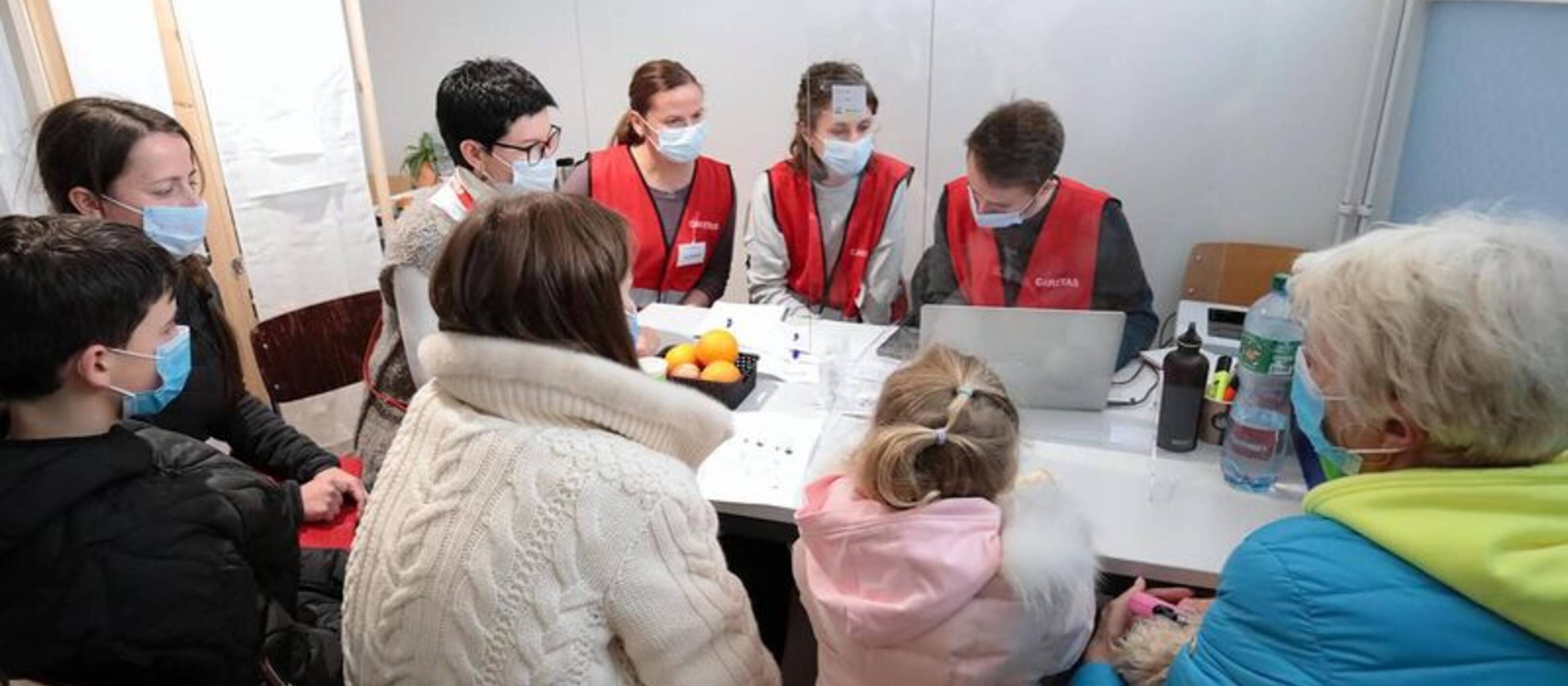

Over 50 projects: How Caritas helps refugees from Ukraine
Caritas Switzerland draws a positive interim conclusion about the domestic assistance it has provided so far for refugees from Ukraine - be it in the areas of registration, finding host families or professional integration. The commitment will now be continued.
Since the outbreak of the war in Ukraine, around 75,000 people have fled to Switzerland. Right from the start, Caritas Switzerland and the regional Caritas organizations were on the job. For example, Caritas Switzerland arranged host families in the federal asylum centers in Boudry (NE) and Bern, and the regional Caritas organizations in the cantons. In Boudry, Caritas also took over the registration of the refugees. This was both done on behalf of the State Secretariat for Migration and in cooperation with Swiss Refugee Aid and, in the case of Bern, with the Salvation Army Switzerland.
The 22 Caritas markets also provided immediate assistance. In order to provide the refugees with quick and uncomplicated access to highly discounted groceries for daily needs, it was sufficient to show a Ukrainian passport until the ID card required for shopping had been issued. In addition, Caritas markets distributed food vouchers worth 100,000 Swiss francs to Ukrainians. The demand was and is great: Compared to the previous year, Caritas markets recorded around 33 percent more purchases in 2022 - around 20 percent of these additional purchases were made by refugees from Ukraine.
Two million Swiss francs for projects in Switzerland
In total, the national Caritas network has been able to implement over 50 aid projects for Ukrainians throughout Switzerland. These include the distribution of clothing, the training of interpreters and mediators, legal and psychological counseling, and various integration programs. Peter Lack, Director of Caritas Switzerland, draws a positive interim conclusion about the domestic aid provided so far: «We have been able to help quickly, comprehensively and without complications.»
However, this aid has only been possible thanks to the great solidarity of many donors. Together with Swiss Solidarity, Caritas Switzerland has so far been able to provide around two million Swiss francs for emergency and bridging aid in Switzerland. In addition, Caritas has carried out specific mandates and public missions. This shows that it is part of Caritas Switzerland's DNA to provide efficient and target-group-oriented aid even in emergencies at home.
In its projects, which are open not only to Ukrainians but also to refugees from all other countries, Caritas was also able to count on the support of numerous volunteers.

«The solidarity of the population was and is great, for which we at Caritas are all very grateful. What is important now, however, is that the war and its consequences are not forgotten.»Peter LackDirector caritas switzerland
Over 4,180 people placed with host families
One example of the voluntary commitment of the population is the host families. The cantons of Aargau, Geneva, Glarus, Solothurn and Zug have commissioned regional Caritas organizations to find and care for people who want to host Ukrainians in their homes. So far, 1,780 refugees have been accommodated in 772 households in these cantons. In addition, there are around 2,400 people from the aforementioned federal asylum centers in Boudry and Bern, who have been placed with around 1,170 families on behalf of the federal government.
The mediation has proven successful. In the vast majority of cases, the people involved are satisfied with the temporary cohabitation. It is enriching for both the Ukrainians and the host families. The refugees come into a functioning home and have close reference persons; the host families, in turn, know that they have helped people in need with their commitment. Not infrequently, a friendship develops.
In the meantime, the demand for host families has diminished somewhat. This is because, on the one hand, the cantons are striving to find their own accommodation for all Ukrainians. On the other hand, some of the refugees have already moved back to Ukraine. Nevertheless, people are still fleeing to Switzerland, which means that the regional Caritas organizations continue to rely on the solidarity of host families, especially in Zug, Aargau or Solothurn.
After coaching sessions: job placement now begins
Another example of a successful integration program is the «Starthilfe Arbeitsmarkt» project run by Caritas Lucerne. The regional organization has been supporting Ukrainian refugees in their job search since August 2022. So far, it has been in personal contact with around 100 interested people, about 60 of whom are in the "information and application dossier" phase and 30 in individual coaching.
In the coming weeks, Caritas Lucerne will approach employers and place Ukrainians according to their job profile. The biggest challenge is the language. Often the knowledge of German or English is not yet sufficient for the job market. This is because even for simpler jobs or those with customer contact - in the catering industry, for example - basic communication must be possible. Another hurdle is the recognition of training. The procedures often take a very long time until the necessary evidence is available.
Caritas Lucerne is working on the project with the public sector, the Ukrainian cultural and meeting center «Prostir» in Lucerne, associations and employers. The Economic Development Agency of the Canton of Lucerne is also involved. The project is expected to last until the end of 2023.
Another project for the professional integration of refugees from Ukraine is carried out by Caritas Jura. Interested persons can complete a two-week training course here in the field of cleaning and housekeeping services. In addition to basic language skills, they gain an insight into the maintenance and cleaning of buildings, technical facilities and green areas.
Many existing Caritas projects for refugees from Ukraine accessible
The example from Jura shows that the regional Caritas organizations also make their existing integration programs accessible to the refugees from Ukraine. At the beginning, the counseling sessions on everyday topics such as school enrollment, health insurance, public offices or family reunification were particularly in demand.
In order to get in touch with compatriots as well as Swiss people, Ukrainians can also take advantage of the «Link» partner program in Neuchâtel, the «Dialog» youth meeting points in Aarau or the «mit mir» sponsorship program for disadvantaged children. Finally, the families also benefit from the Caritas KulturLegi, which gives them access to numerous leisure and educational activities. All of this helps the refugees to establish new social contacts and to find their way around Switzerland more quickly.
In Fribourg, Caritas Switzerland also organizes specific activities on behalf of the canton for the mental well-being of particularly vulnerable people living at the Maison Formation et Intégration in Matran. Childcare is also strengthened there so that Ukrainian mothers can attend language courses, go through administrative procedures or look for work.
Two more collective housing facilities to open
Caritas Switzerland fulfills another important cantonal mandate in Schwyz. This involves the temporary accommodation and care of Ukrainians. In September, a shelter for around 100 refugees was opened in the district of Seewen in the municipality of Schwyz. Two more collective accommodations are being planned: one is to be opened in Brunnen in the next few weeks, and later one in Altendorf.
Caritas Switzerland will also continue the federal mandate in the Federal Asylum Center in Boudry (NE) and in Ticino (in partnership with SOS Ticino). After the initial registration, the focus will now be on legal advice and representation for persons with protection status S. This mandate runs parallel to the one Caritas Switzerland has been implementing since 2019: legal advice and representation for all asylum seekers under the new asylum law in the regions of Western Switzerland and Ticino-Central Switzerland (also in partnership with SOS Ticino).
The many different projects show: Caritas Switzerland and the regional Caritas organizations help the Ukrainians who have fled at the most diverse levels. The projects are both short and long-term, from emergency aid to social and professional integration.
For this reason, a significant part of the more than 50 projects in Switzerland will continue one year after the outbreak of war in Ukraine - in order to enable those who have fled to live as dignified a life as possible. Caritas confirms this in its Strategy 2025, in which it states, among other things, that it is a leading player in disaster relief at home and combats poverty in Switzerland. This has been made possible by decades of experience, the great commitment of all employees, and close cooperation within the domestic network.
Further Information
Header image: Caritas Switzerland staff register a group of Ukrainian refugees applying for S protection status at the Federal Center in Boudry. © Ghislaine Heger